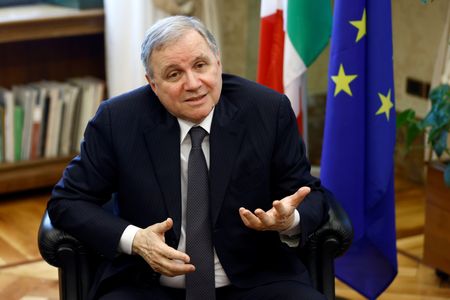 1
1 1
1

By Valentina Za and Francesca Landini
MILAN (Reuters) – The European Central Bank can keep its accommodative policy stance if euro zone governments act to offset higher prices, including by supporting households in order to avoid wage increases, a top policymaker said.
ECB Governing Council member Ignazio Visco told Bloomberg’s Italy Capital Markets Forum on Wednesday that there was no sign in Europe of “second round” price effects which are linked to wage increases or inflation expectations becoming unchained.
The situation is very different from the United States where households’ disposable income has gone sharply up and “monetary policy can only be restrictive.”
The Federal Reserve a week ago raised interest rates for the first time since 2018.
“There is no demand shock in Europe, there is a supply shock,” Visco said. “Inflation expectations are well anchored at around 2%,” he added.
Visco rejected the idea that higher market interest rates reflected a mismatch between investors and the central bank.
He said higher borrowing costs for companies stemmed from the uncertainty caused by the war in Ukraine, with investors trying to gauge the direct and indirect impact on firms, especially banks, of the conflict.
The ECB on its part had to avoid “surprising (markets) too much” and “talking too much”, adding he was already making an exception to that rule.
Visco called for ongoing coordination between budget and monetary policies, as happened during the pandemic, to allow the ECB to only very gradually normalise its ultra-expansionary monetary policy.
“The world we need to move into is a world without negative real interest rates,” he said.
However, there is no need for quick action at present.
“We don’t know what the new normality will be … we have to be careful, we have to remain open,” Visco said.
“If there are second-round effects then it’s the central bank’s responsibility to stop those,” he added.
(Reporting by Valentina Za and Francesca Landini, editing by Maria Pia Quaglia and Keith Weir)